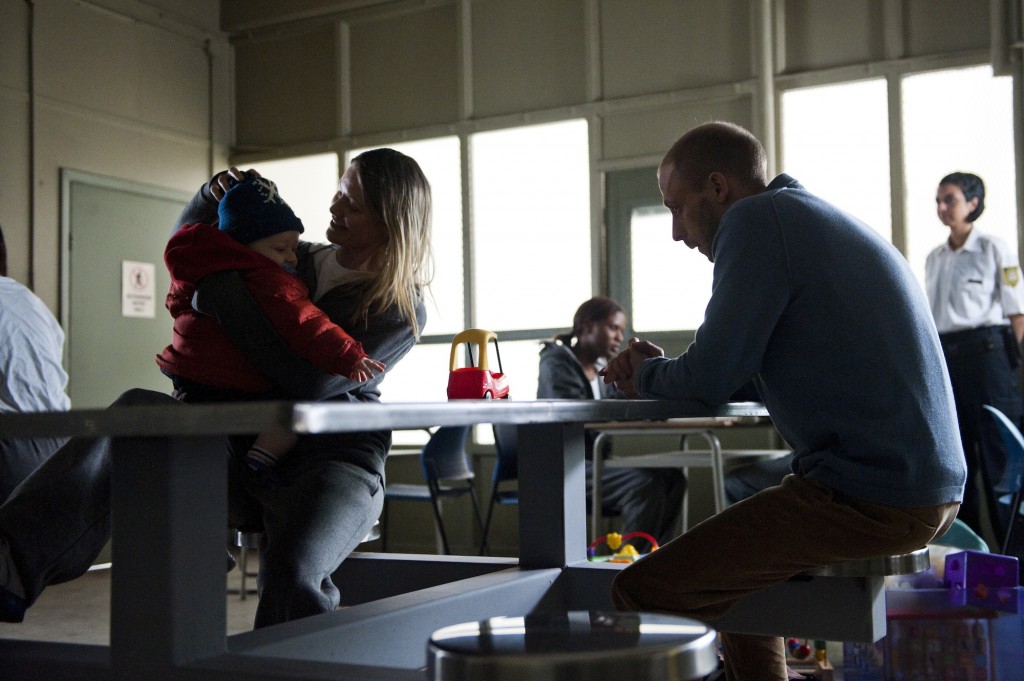The Husband, the latest film directed by Bruce McDonald is billed as a mix of comedy and horror, and while it possesses aspects of both, it only fits this definition by the broadest definitions.

There are certainly funny moments, but they are of the most black and tragic humour, inspiring dry laughs at the sad absurdity of the situation. It is also very tame horror by any standards with no real blood, and very little even attempted violence; however there is a sick, overwhelming, creeping dread in the film, a sense of threat and escalation that sits like a fist around the audience’s windpipe the full length of the film. At its core The Husband is a contemporary tragedy, the kind that could only happen is the present cultural moment, carved out of isolation and social pressure and profound grief.
Henry Andreas (Maxwell McCabe-Lokos), the drawn and hollow-eyed protagonist, is stretched to his limits from the opening seconds of the film, which shows him frantically trying to change his car tire while his baby cries in the car, on his way to visit his wife in jail. His wife, Alyssa (Sarah Allen), a former teacher who was convicted after sleeping with one of her students, a 14-year-old boy, is near the end of her sentence. Henry has been raising their infant son Charlie alone, working at an ad agency job he loathes but cannot leave due to his wife’s legal bills, and dealing with intense shame in the wake of sexual assault conviction.
The primary tension in the film is created by Henry’s nearly uncontainable rage: barely stoppered, constantly threatening to explode, and occasionally bubbling over in increasingly erratic behaviour. He lashes out at co-workers who torment him, screams at his wife, and each of these outbursts provides a very temporary moment of triumph soon eclipsed by consequences of even greater pain: losing his job, straining the already tenuous relationship with Alyssa. But most dangerously, his fury becomes a kind of fixation on the teen boy, Colin, that his wife assaulted, making him see the child as a rival rather than a victim of a crime. As he draws closer to the boy, takes more and more risks and becomes more threatening, the prospect of something truly awful happening looms ever larger.
Maxwell McCabe-Lokos portrays much of Henry’s character and emotional state through posture and movement: bent, tense, angry.
Hollow-eyed and sunken-cheeked, with very little softness and very few gentle moments, all reserved for his interactions with his son. He is also a very small man, with a slight frame and small stature. The other men in the film are so much taller and broader, making his anger even more sad and ridiculous at moments. His physical smallness highlights the profound existential impotence that he feels, which is especially dramatic when standing near his wife’s victim, Colin — who, even at a very childish 15, is still taller and more substantial thank Henry (and may be part of the reason that Henry sees Colin as some kind of threat). During the climax, the vast size difference between Henry and Colin’s father transform the scene from threat and fear to pitiful ineptitude.
A wonderul character performance is put in by Stephen McHattie as Armand, Alyssa’s stoic father, who is a major emotional and financial support for Henry, lending him money and helping him care for Charlie. The two also clash when Armand seems quick to gloss over the severity of Alyssa’s crimes at a moment when Henry is at his angriest and most ashamed. August Diehl is also wonderfully convincing as Rusty, a friendly acquaintance of Henry’s and one of the few people he still maintains contact with, who finds himself pressed to keep Henry’s increasingly dangerous behaviour in check.
As hinted at by the title, The Husband is a very male movie, all about power and shame, and defined in part by a profound lack of female characters — indeed, almost all the women in the film most are present in their absence. Alyssa’s screen time is exceedingly limited, bound by Henry’s interactions with her: prison visits, a phone call, and his flashbacks and dreams. She is distant and contained, the hole she has left in his life (like the bed they bought together that he refuses to sleep in) more palpable than her presence. There is no mention ever made of her mother; we only see her dad, Armand, a tough but loving man, framed in an unspoken loneliness of his own. Colin’s mother is also strangely absent, and during the film’s climax, we only hear that she is “gone.” Though the crux of the film is all about the harm that a woman has done, and the fallout from it, most female characters are reduced to roles and obstacles: Henry’s boss Claire, Charlie’s nanny, a teen babysitting Henry very briefly considers seducing for revenge. The result is a film defined by strange combination of broken men and complicated male relationships that are nonetheless defined by the absent women.
The Husband is a haunting film — not because of any violence or gore, or any mention of ghosts, but because there is no real redemption beyond resignation, a little mercy, and the decision to choose forgiveness over rage and vengeance. The resolution is as much a defeat as it is a triumph, but a reversal of what was happening throughout the film. Rather than choose short-term victory and greater loss, Henry finally chooses temporary defeat for the hope of a long-term renewal. It’s a small, fragile kind of victory, but a necessary one
